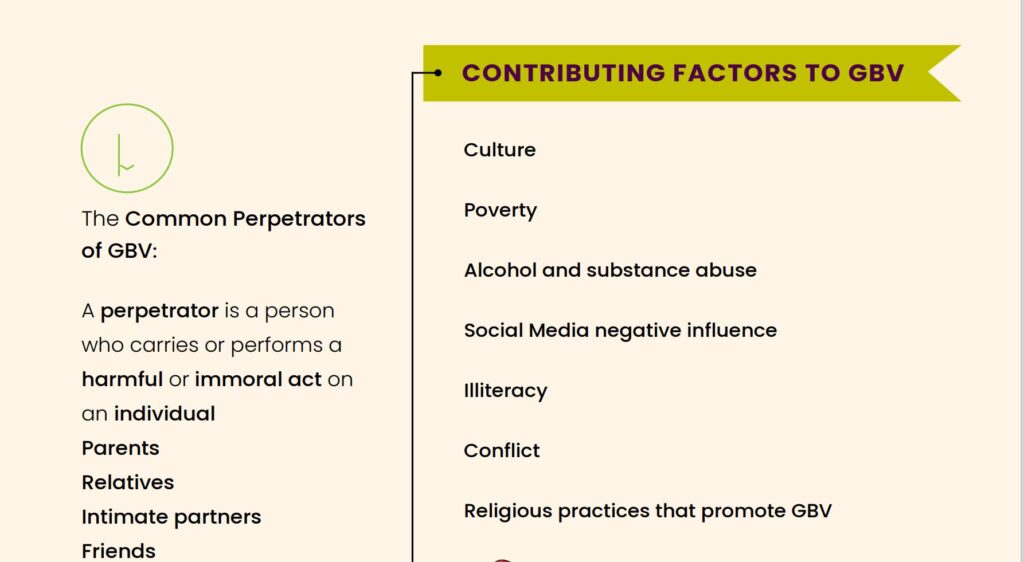Gender Based Violence
Welcome to the Gender Based Violence section of your G-jali journey, where we provide vital information on Gender Based Violence awareness.
Gender refers to the characteristics of women, men, girls, & boys that are socially constructed. This includes norms, behaviours, & roles associated with being a woman, man, girl, or boy, as well as relationships with each other. As a social construct, gender varies from society to society and can change over time. Violence is any form of harm directed against oneself, another person, a group, or a community.
What is Gender-Based Violence? Gender-based violence (GBV) is any form of violence directed at an individual based on gender identity. Both children and adults can experience and be affected by violence.
Sexual Violence is any sexual act, attempt to obtain a sexual act, or other act directed against a person’s sexuality using coercion, by any person regardless of their relationship to the victim, in any setting. It includes rape, defined as the physically forced or otherwise coerced penetration of the vulva or anus with a penis, other body part, or object. In Kenya, Sexual violence on children is referred to as defilement.
Sexual violence can include the following:
- Sexual harassment may involve any conduct of a verbal, nonverbal or physical nature, including written and electronic communications. Sexual harassment can take a variety of forms – from looks and words though to physical contact of a sexual nature. Examples of sexual harassment include sharing sexual or lewd anecdotes or jokes; unwelcome touching, including pinching, patting, rubbing, or purposefully brushing up against another person, repeatedly asking a person for dates or asking for sex and making sexual comments about appearance, clothing, or body parts, among others.
- Rape is any non-consensual vaginal, anal or oral penetration of a sexual nature of the body of another person with any bodily part or object, including through the use of physical violence and by putting the victim in a situation where they cannot say no or complies because of fear. This can be by any person known or unknown to the survivor, within marriage and relationships, and during armed conflict.
- Corrective rape is a form of rape perpetrated against someone on the basis of their sexual orientation or gender identity. It is intended to force the victim to conform to heterosexuality or normative gender identity.
- Sexual violence in conflict: Acts of violence against women include violation of the human rights of women in situations of armed conflict, such as systematic rape, sexual slavery and forced pregnancy, as well as forced sterilization, coercive/forced use of contraceptives, female infanticide and prenatal sex selection.
Intimate partner violence refers to behaviour by an intimate partner or ex-partner that causes physical, sexual or psychological harm, including physical aggression, sexual coercion, psychological abuse and controlling behaviours. Intimate partner violence can include acts of physical violence such as slapping, chocking or burning, sexual violence including spousal rape, psychological violence such as fear by intimidation or forced isolation, and economic violence by maintaining total control over financial resources, withholding access to money, and/or forbidding attendance at school or employment, among others.
Physical violence means the intentional use of physical force or the threat of physical force against another person that results in physical, sexual, or psychological harm. Examples include; choking, strangling, kicking, punching, slapping, and beating among others.
Economic violence is ‘any act or behavior which causes economic harm to an individual’. It involves controlling the victim’s ability to ‘acquire, use, and maintain economic resources, threatening their economic security and potential for self-sufficiency. Economic violence often occurs in the context of intimate relationships.
“any act including confinement, isolation, verbal assault, humiliation, intimidation, or any other treatment which may diminish the sense of identity, dignity, and self-worth.”
These include forced male circumcision, female genital mutilation; child marriage; virginity testing; girl child beading; except with the advice of a medical geneticist, organ change or removal in case of an intersex child; or any other cultural or religious rite, custom or practice that is likely to negatively affect the child’s life, health, social wellbeing, dignity, physical, emotional or psychological development.
The use of online digital devices or services to engage in activities that result in physical, psychological, or emotional self-harm or cause harm to another person. Online violence can include the following:
- Cyberbullying: involves sending intimidating or threatening messages.
- Non-consensual sexting: sending explicit messages or photos without the recipient’s consent.
- Doxing: public release of private or identifying information about the victim.
Femicide is the intentional killing of a woman or a girl because she is a woman or a girl. The gender-related motivation of the killing may range from stereotyped gender roles, discrimination towards women and girls, to unequal power relations between women and men in society.

Sexual Consent
Sexual consent means agreeing to take part in any kind of sexual activity, not just penetrative vaginal or anal sex. It applies every time you have sex and it’s an ongoing process – you might agree to sex earlier on and then change your mind – that’s okay. Sometimes, it’s not clear what consent means. You have the right to say ‘no’ at any time – it doesn’t matter if you’ve had sex with your current partner before or anyone else.
What to do in case of sexual or physical violence
- Please do NOT bathe or wipe yourself
- Remove your clothes and put them in a woolen paper bag, or newspaper (To avoid tampering with forensic evidence) and present them to the medical personnel for examination and storage.
- Physically report to a health facility for examination, response, and management before 72 hours and aftercare services.
- Report to your nearest police station for further assistance.
Where to seek Help?
SGBV services are free
- 1195-Domestic and Sexual Violence
- 1190-LVCT Health
- 0800720501-FIDA
- 116-Child Abuse
- 999/ 911/ 112/ 0800722203-Kenya Police
- 0900620800-Nisikize
- 1199/ 999-Kenya Redcross Society and Ambulance Services
